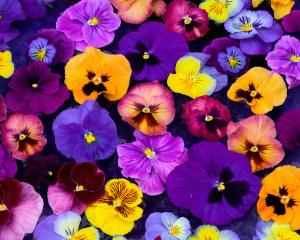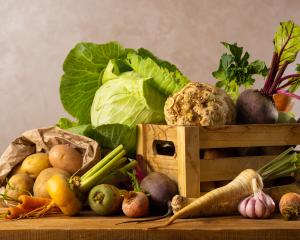Want some tips on getting better results in your garden? The answer may be at the Dunedin Horticultural Society show, says Gillian Vine.
Roses, bonsai, gladioli, dahlias and floral art will be among the attractions at this weekend's Dunedin Horticultural Society (DHS) show, but the biggest drawcards are likely to be vegetables and a display of compost and fertilisers.
Long an advocate of the value of home-made compost, DHS president Dave Young has come up with the idea of showing people what ingredients make good compost and what fertilisers work best for certain veges. It came about, he said, when someone told him her broad bean plants grew 2m tall and had lots of leaves but few beans.
The beans had too much nitrogen, he said, because the gardener had been overly generous in adding compost and blood and bone to the soil.
Animal manures also pushed up the nitrogen level and there was a tendency to use too much granulated fertiliser, such as Nitrophoska Blue. Half of what most gardeners used was sufficient, Mr Young said, although he doubted if anyone would go to the extremes one man did - he counted the individual granules so each plant got exactly the same dose of fertiliser.
The broad bean patch he described would have been more suitable for lettuces, cabbages and Brussels sprouts, all of which tolerated high nitrogen levels. The following year, silverbeet and leeks would be his preferred crops, with courgettes, pumpkins and celery in year three.
"I'd emphasise the importance of a balanced soil with more phosphate and potash," Mr Young said.
Asked how to achieve that, he suggested rose fertiliser - "It is high in phosphate and very high in potash" - and was suitable for adding to soil where potatoes were to grow.
He mulches his vegetables and flowers, including his prize-winning potatoes and dahlias, with barley straw, which he says contains more nutrients than pea straw.
"Barley straw is a very soft straw [and readily breaks down]. I think it is excellent for mulching," Mr Young said.
"Wheat straw is too hard," he added.
Compost will also feature at the show.
Compost-making techniques include bokashi, a Japanese system that ferments household waste, and one of these will be on display at the show.
Unlike other systems, bokashi can deal with meat, cheese and fish scraps.
"You can use that for a starter in your compost," Mr Young said.
With the expected line-up of quality flowers after the warm summer and plenty of veges on show - including a display by the Dunedin Vegetable Growers Club - he is hoping for high public interest in the show.
The show
The Dunedin Horticultural Society's summer show is being held tomorrow and Sunday at Forbury Park Raceway, Victoria Rd, Dunedin. The show is open to the public from 2pm until 5pm tomorrow and from 10am to 4pm on Sunday.












